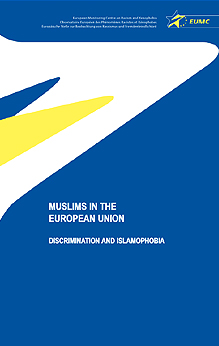
Publisher: European Monitoring Centre on Racism and Xenophobia (EUMC)
Release Date: December 2006
Source: https://fra.europa.eu/en/publication/2012/muslims-european-union-discrimination-and-islamophobia
The EUMC has been conducting qualitative studies on anti-Muslim discrimination since 2001. This year’s report monitors ten countries, including the UK. It notes that “although there is currently no legally agreed definition of Islamophobia, nor has social science developed a common definition, policy and action to combat it is undertaken within the broad concepts of racism and racial discrimination”. Thus reports of ‘racist violence and crime’ provide the base source material. In most EU countries the criminal justice systems do not record the faith of the victim of a hate crime (this was adopted on a pilot basis by the Met Police but results have not been placed in the public domain) so it is necessary to use ethnic or nationality proxies. The Home Office British Crime Survey found Pakistanis and Bangladeshis consistently to be more at risk of being a victim of racially motivated crime than the other ethnic groups surveyed. The EUMC report notes that “the true extent and nature of discrimination and Islamophobic incidents against Muslim communities remains severely under-reported an d under-documented in the EU. There is a lack of data or official information on, first, the social situation of Muslims in Member states and, second, on the extent and nature of Islamophobic incidents”.
The report includes a table of the Muslim population of 25 EU states (pages 27-29), providing a total of 13 million. However the figure is on the low side, because it estimates the French Muslim population to be in the region of 3.5 million. In reality France might have three times as many Muslims. It also notes the lower age profile of European Muslims – in the UK for example, the average age of Muslims is 28, eleven years younger than the rest of the population.
A section of the report deals with the non-Muslim population’s perception of Muslims. It finds that positive opinions of Muslims have declined most sharply in Germany and Spain, in comparison with France and Britain. So interestingly, the parts of Europe where facism was strongest last century remain xenophobic today. These countries may be the touchstone of increasing intolerance across Europe. The report quotes a UK survey by York University in April 2005 that found that 43% of youth in regional towns and cities becoming more Islamophobic – 10% of 13-14 year olds supported the BNP.
The 118 page report documents findings in the areas of employment, education and housing. It concludes by calling on Member states to provide migrants, including Muslims, with equal opportunities, and to take steps to prevent their marginalization and exclusion from mainstream society.
The EUMC has also published a supplement – ‘Perceptions of discrimination and Islamophobia – voices from members of Muslim communities in the European Union’, drawing on 58 interviews, including young Muslims in Britain. It has found that feelings of exclusion can be more marked among European-born Muslims in comparison with their parents. It notes that “respondents in Denmark, Germany, France, the Netherlands and the UK reported that policies and public discourse in the last five years have negatively impacted on the sense of belonging. In the experience of some respondents, even those who had previously felt part of society, now feel increasingly alienated and rejected”.
Pundits like Kenan Malik declare that “the degree of hatred and discrimination is being exaggerated to suit particular political agendas, stoking up resentment and creating a victim culture”. The EUMC report thus warrants wider publicity. It also serves as a warning bell of increasing xenophobia across Europe. As noted by Liz Fekete in her essay in ‘Race and Class’ (Vol. 48, Issue 2, 2006): “the realigned Right…is using state power to reinforce fears about ‘aliens’ and put into place legal and administrative structures that discriminate against Muslims…central to such a process is a generalized suspicion of Muslims, who are characterized as holding on to an alien culture…”
